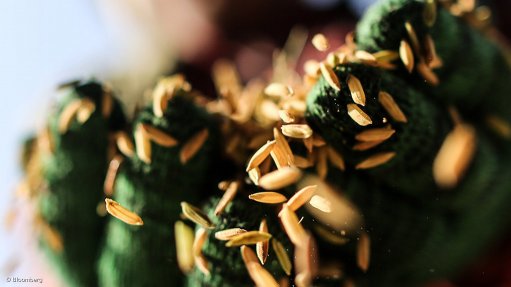
Photo by: Bloomberg
The Mozambique Ministry of Agriculture has awarded a Royal HaskoningDHV-led consortium a $5.4-million irrigation services provider contract, which would see the engineering and construction group design and implement new and rehabilitated irrigation schemes as well as improve the existing irrigation infrastructure of a 3 000 ha rice irrigation project.
The World Bank-funded Sustainable Irrigation Development Project (PROIRRI), which would run for six years, sought to increase small-scale agricultural food production and raise farm productivity in central Mozambique.
As a result of the project, food production would increase from a once-a-year harvest to one-and-a-half harvests a year and, by the end of the project, rice yield a hectare would increase from the current 1 t/y to 4 t/y, producing 12 000 t/y of rice overall.
PROIRRI project manager at the Ministry of Agriculture Eugénio Nhone said in a statement on Wednesday that the project aimed to promote and ensure self-employment, higher production, increased productivity and sustainability of the rice crop, while guaranteeing food security and a regular market for rice.
“Other benefits include reducing the country’s carbon footprint, improving energy efficiency, job creation and skills transfer,” he commented.
The project, which would run until 2017, would be implemented at district level and considered all aspects related to rice production, harvesting and postharvesting processing, including sale.
It was also designed to organise producers and identify markets for the sustainably produced rice, incorporating new irrigation technologies where appropriate.
“This will be done bearing in mind that the beneficiaries are small producers using manual labour, which limits the use of mechanisation. The project has many challenges, not least the long distances between centres and confirming land rights to small farmer associations, which involves establishing links with various stakeholders,” added Royal HaskoningDHV agricultural sociologist Manuel Jossefa.